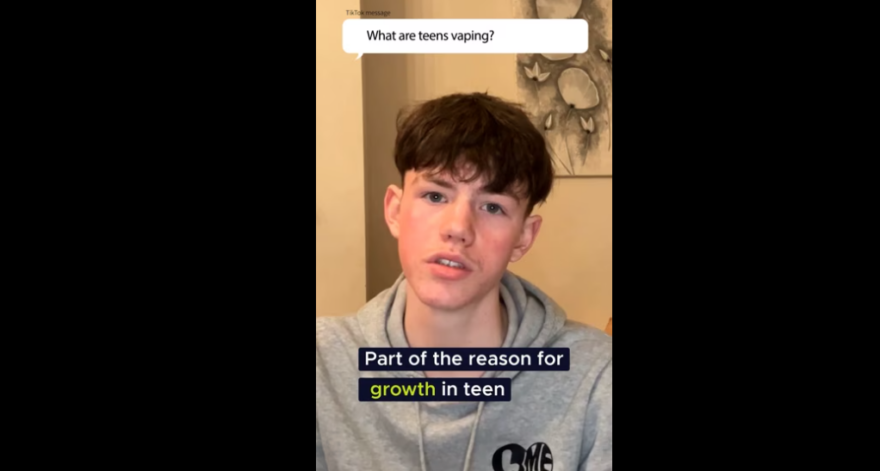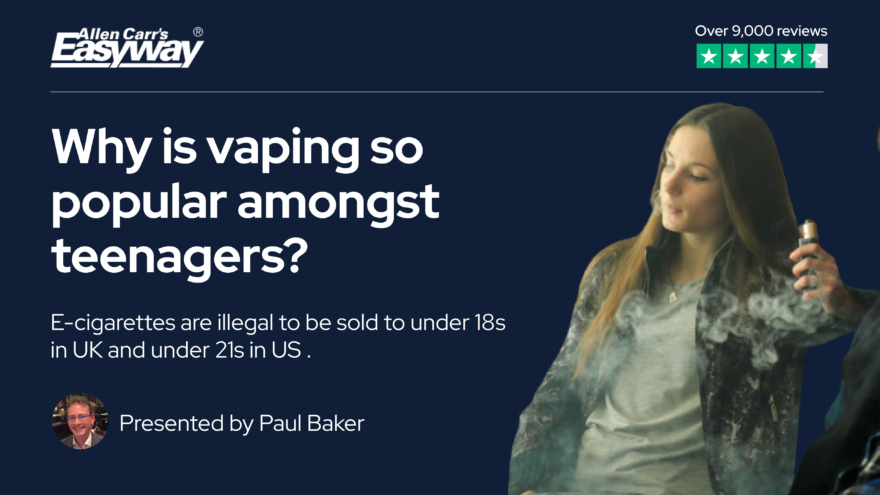Why and what are teens vaping?
There are many reasons teens vape including ease of access, curiosity, pushing against boundaries, peer pressure and also stress.

Reasons why teenagers are vaping
Just like with traditional cigarettes, some people start vaping due to peer pressure and the desire to fit in with others it is curiosity.
Teenagers frequently say they first tried an e-cigarette because someone offered them one and they tried it due to a mixture of wanting to appear mature or “grown-up” and not wanting to seem uptight.
In surveys, US adolescents say it is because of the flavours, of which there are now an estimated 16,000 available and the widespread advertising has made them curious about the products and so want to try them.
In the UK, the main reason stated was “to give it a try” (65%) presumably due to the widespread marketing and because they saw a friend or a family member vaping and thought, “There has to be something good about this, or why would they do it?”. The next highest response “other people use them and I join in” (11%) and “I like the flavours” (10%).
The most common reasons that teen start vaping are:
-
Peer pressure and social influence
Teens often feel pressured to fit in with their peers. If their friends or social groups are vaping, they might start as well in order to be accepted or appear cool.
-
Curiosity and experimentation
Adolescence is a time when many experiment with different behaviours, including the use of e-cigarettes.
The novelty of vaping devices, the colors and the variety of flavours can be particularly appealing to young people which is why Big nicotine has spent billions marketing vapes in this way to appear cool, sexy and modern.
-
Marketing and perceptions
Vaping is heavily marketed, sometimes directly or indirectly targeting younger audiences through social media and appealing flavours.
These marketing strategies can create the perception that vaping is less harmful than smoking traditional cigarettes and even that they are harmless!
-
Misinformation about safety
Many teens believe that vaping is a safer alternative to smoking.
Although e-cigarettes generally contain fewer toxic substances than traditional cigarettes, they are not safe, have long term health risks and can contain high levels of nicotine, which is addictive.
-
Stress and mental health
Some teens may use vaping as a way to cope with stress, anxiety, or depression.
-
Accessibility and legality
In some places, it’s easier for teens to buy vapes than cigarettes due to regulatory gaps or enforcement issues, making vaping more accessible.
Most e-cigarette liquid contains nicotine which is highly addictive.
In fact, vaping is now more popular than traditional cigarettes with 2.1 million middle and high school students in the US using the product in 2017. In the UK the number of students smoking is 300,000 and vaping is 300,000.
What are teens vaping?
Part of the reason for the growth in teen vaping is that vaping liquid, known as vaping juice, comes in many flavours.

The most popular flavours of juice are:
- UK – fruit (60%), chocolate/desserts/candy (17%), Energy drink or soft drink (5%), menthol (3%)10 .
- US – fruit (58%), menthol (54%), candy/dessert/other candy (30%), mint (28%)27
In 2023, disposable vapes were the preferred product in UK at 69% of all teen vapes (in 2021 it was 8%)
In US it is Puff Bar 15%, Vuse 13%, Hyde 6% and SMOK 4%. More than half, like the UK, used disposable e-cigarettes
% of US students who said they vaped during the last 30 days, 2018

Source: University of Michigan Monitoring the Future survey
The vaping devices are electronic products that heat a liquid to produce a vapor/smoke. They come in many shapes and sizes from looking like cigarettes, to USB flash drives (JUUL), to large tank system devices.
In the past year there has been significant growth in disposable vapes or elf bars and it is these that are now most popular among children per Dr Mike McKean. This has led the UK Government debate whether to ban highly flavoured vapes and elf bars due to the concerns of creating addiction in young people.
Watch the video or scroll down to the full article

Part of the reason for the growth in teen vaping is that vaping liquid, known as vaping juice so that it appears healthy, comes in many flavours.
In the UK the most popular favours are fruit (60%), chocolate/desserts/candy (17%), Energy drink or soft drink (5%), and menthol (3%).
In the US it is fruit (58%), menthol (54%), candy/dessert/other candy (30%), mint (28%)
What’s holding you back?
Not sure if you really want to quit vaping?
Want to quit, but concerned that you’ll find it tough?
Worried that you’ll be deprived for the rest of your life without vapes?
We know that taking the first step can be difficult, but we’re here to answer your questions in complete confidence – with no pressure and no judgment.
Start the free quizWhat is in vaping juice / liquid?

The first thing to say is that the liquid is far from being a healthy juice! The word juice is a term used by “Big Vape” to encourage the illusion that vaping is healthy and safe.
Vaping liquid / juice contains around 80 different chemicals.
Not one of the four main ingredients in vapes (propylene glycol, vegetable glycerin, nicotine and any number of different flavourings) are designed to be breathed into your lungs.
Watch the video or scroll down to the full article

-
Flavourings
There’s thousands of flavours out there, but some of them have sketchy additives.
There’s one called diacetyl that makes stuff taste buttery, like in popcorn or desserts. It’s not designed to be inhaled into your lungs and it can wreck them.
They even call it “popcorn lung” because it’s so nasty.
It’s banned in some countries including UK, US & EU, but is still found in illegal vapes and legally in many countries.
-
Propylene Glycol (PG)
They use this stuff to make fake smoke for movies, but it’s also in antifreeze, not something you want to be breathing in! It’s not designed to be inhaled into your lungs and causes tremendous damage.
It can mess up your lungs and eyes.
-
Glycerin
It is used to add sweetness and although it is used in junk foods, soaps, medicines, and skin products – you’ve guessed it – it isn’t designed to be inhaled into your lungs and causes tremendous damage.
Not only that… Alarming findings from English schools where 1 in 6 vapes were found spiked with a dangerous synthetic drug “Spice”.
Vaping juice contains around 80 different chemicals.
Not one of the four main ingredients in vapes are designed to be breathed into your lungs.
There’s thousands of flavours out there, but some of them have sketchy additives.
There’s one that makes stuff taste buttery, like in popcorn or desserts. It’s not designed to be inhaled into your lungs and it can wreck them.
Another makes fake smoke for movies, but it’s also in antifreeze, not something you want to be breathing in! It’s not designed to be inhaled into your lungs and causes tremendous damage.
It can mess up your lungs and eyes.
Another adds sweetness and although it is used in junk foods, soaps, medicines, and skin products – you’ve guessed it – it isn’t designed to be inhaled into your lungs and causes tremendous damage.
Not only that… Alarming findings from English schools where 1 in 6 vapes were found spiked with a dangerous synthetic drug “Spice”.
This is before you heat the juice so watch the video of what happens then.
What is in vaping juice / liquid when it is heated?

When you heat up that juice, you get even more harmful elements:
-
Ultrafine particles
These tiny bits can get deep into your lungs and mess things up – even more so if you already have asthma or lung problems.
They might even trigger a heart attack, which is scary.
-
Volatile organic compounds
They can make your eyes, nose, and throat all irritated, give you headaches and nausea, and mess with your liver, kidneys, and nervous system. No thank you!.
-
Cancer causing toxins
Yup, you read that right. Some of the stuff in there can actually give you cancer. Like formaldehyde and benzene. Not cool.
-
Propylene Glycol (PG)
Research has shown that heating propylene glycol changes its chemical composition, producing small amounts of propylene oxide, a known cancerous toxin.
-
Heavy metals
Like nickel and lead. Breathing that in can mess up your breathing and give you diseases. Not worth it.
So basically, vaping might seem like a harmless thing to do, but it’s something that will cause you life long harm.
Why wait to quit vaping?
Our online video program is tailored for teens, offering a powerful and supportive way to quit for good.
Buy now for just US$10Free Online Quiz






